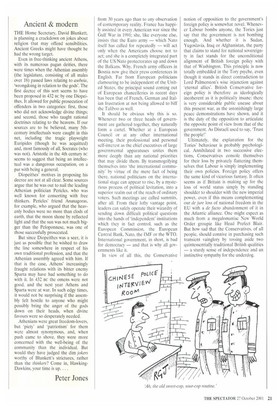Ancient & modern
THE Home Secretary, David Blunkett, is planning a crackdown on jokes about religion that may offend sensibilities. Ancient Greeks might have thought he had the wrong target.
Even in free-thinking ancient Athens, with its numerous pagan deities, there were times when the Athenian assembly (the legislature, consisting of all males over 18) passed laws relating to asebeia, 'wrongdoing in relation to the gods'. The first decree of this sort seems to have been proposed in 432 BC by one Diopeithes. It allowed for public prosecution of offenders in two categories: first, those who did not acknowledge divine things; and second, those who taught rational doctrines relating to the heavens. If our sources are to be believed, many 5thcentury intellectuals were caught in this net, including the tragic playwright Euripides (though he was acquitted) and, most famously of all, Socrates (who was not). Aristotle in the 4th century BC seems to suggest that being an intellectual was a dangerous occupation, on a par with being a general.
Diopeithes' motives in proposing his decree are not at all clear. Some sources argue that he was out to nail the leading Athenian politician Pericles, who was well known for consorting with free thinkers. Pericles' friend Anaxagoras, for example, who argued that the heavenly bodies were no more than clods of earth, that the moon shone by reflected light and that the sun was not much bigger than the Peloponnese, was one of those successfully prosecuted.
But since Diopeithes was a seer, it is just as possible that he wished to draw the line somewhere in respect of his own traditional profession, and that the Athenian assembly agreed with him. If that is the case, Athens' increasingly fraught relations with its bitter enemy Sparta may have had something to do with it, In 432 BC the omens were not good, and the next year Athens and Sparta were at war. In such edgy times, it would not be surprising if the assembly felt hostile to anyone who might possibly bring the anger of the gods down on their heads. when divine favours were so desperately needed.
Athenians were great freedom-lovers, but 'piety' and 'patriotism' for them were almost synonymous, and, when push came to shove, they were more concerned with the well-being of the community than the individual. But would they have judged the dim jokers worthy of Blunkett's strictures, rather than the thinkers? Come in, HawkingDawkins, your time is up. .
Peter Jones










































































 Previous page
Previous page